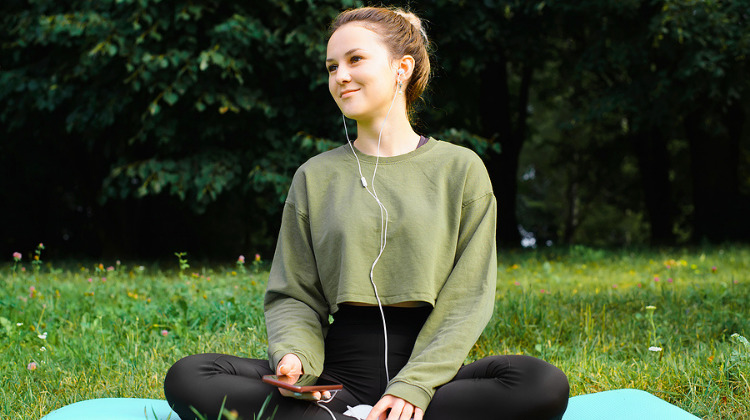Identifying our stress triggers is a key step in the journey to manage and mitigate stress. But despite our best efforts, stress can sneakily manifest itself either physically or mentally. Instead of ignoring these symptoms, there are several ways that you can transform your approach to handling stress.
1. Deep Breathing
Deep breathing triggers a physiological response in the body in the form of lowering blood pressure, steadying heart rate, elevating oxygen consumption, and tapering stress hormones. Cultivating an awareness of your breath can go a long way in how you cope with and manage stress. There are different types of breathing methods, and the one thing they share in common is that they are all positive destressors.
- Boxed Breathing – also known as Square Breathing: this simple breathing technique involves you counting to four while you inhale, pausing before exhaling for another four counts, exhaling slowly for four counts, and pausing for another for counts before inhaling. Repeat until you feel centered. This technique is even suitable for children.
- Progressive Muscle Relaxation: this technique relies on you tensing up different muscle groups and relaxing them upon exhaling. For example, take a slow deep breath in. Tense the muscles in your feet. Then breathe out and release the tension from your feet. Repeat with other muscle groups.
- Breath Focus: Find a comfortable place to begin this breathing technique. Close your eyes and pick an image along with a word/phrase to use as a focal point while breathing. Focus on the image while practicing this technique. Repeat the word or phrase when finished exhaling.
2. Tune It Out
 Selecting the right kind of music can work wonders when managing stress. Also, this technique can be easily incorporated into your daily life without interfering in your routine. Listen to music while working out, cooking, riding on your daily commute, and cleaning.
Selecting the right kind of music can work wonders when managing stress. Also, this technique can be easily incorporated into your daily life without interfering in your routine. Listen to music while working out, cooking, riding on your daily commute, and cleaning.
3. Exercise
A regular workout routine is an effective method of managing and reducing stress. Exercise improves mood and is beneficial for your physical health. This doesn’t mean you have to shell out money on a gym membership or make drastic changes to your daily schedule. You can incorporate exercise into your cleaning routine, choose workout videos online and engage from the comfort of your own home, extend your dog walks by 20 minutes, or practice natural movement by gardening and spending time outdoors! Exercise shouldn’t be intimidating; movement is a natural part of life.
4. Practice Mindful Fidgeting
 Sounds a bit odd, right? But these handheld gadgets are friendly for all ages. The viral fidget toys – pop-its, spinners, cubes, and more – are favored by kids and teens, but such toys have also helped adults in the workplace as a small outlet for stress or office restlessness. They also provide relief and calm to those who experience bouts of jumpiness and anxiety. Grab yourself a pop-it over a cup of coffee while at the office and give it a try.
Sounds a bit odd, right? But these handheld gadgets are friendly for all ages. The viral fidget toys – pop-its, spinners, cubes, and more – are favored by kids and teens, but such toys have also helped adults in the workplace as a small outlet for stress or office restlessness. They also provide relief and calm to those who experience bouts of jumpiness and anxiety. Grab yourself a pop-it over a cup of coffee while at the office and give it a try.
5. Improve Your Diet
What we eat and drink play a significant role in our mental health. Ever hear that a happy tummy makes a happy baby? Well, that is quite true for adults as well. Improving gut health will improve your overall health and mood. Rather than dumping out your pantry and investing in a diet fad, consider making these changes first:
- Change your cooking oil: Do you know that conventional cooking oils such as corn, canola, and vegetable oils can disrupt your gut health? Olive oil is a good healthy fat, but it is not meant to be used in high heat. Reserve using olive oil for garnishes. A healthy cooking oil is avocado oil, which is now becoming more readily available at commercial supermarkets. Ghee, animal fats, and butter are also healthy substitutes for cooking oils.
- Take a Probiotic: Purchase a high-quality probiotic, preferably one that is food-based for better absorption. Probiotics improve gut health, thus improving your overall mood. There are probiotics formulated for women, men, and children.
- Cut the caffeine, or change the caffeine! Do you know that coffee is one of the most processed food items? Instead of purchasing coffee from a conventional brand, perhaps make the effort to buy it from a local cafe and educate yourself on its source and cultivation. If you want to ditch the caffeine altogether, you can incorporate calming herbs into your diet such as chamomile, anise seed, and mint.
6. Get Some Sleep
Lack of sleep affects not only your physical health, but sleeplessness can negatively impact mental health, too. Before tucking yourself into bed, make sure that your bedroom promotes a good night’s sleep by ensuring it is a dark, cool, and quiet setting for you to get optimum rest.
Stress affects us all in some way or another; however, if not managed appropriately, it can impact your mental and physical health. By incorporating these techniques into your lifestyle, your stress will be transformed into relaxation. Unwind with herbal tea, zone out to some relaxing music, and enjoy a nourishing meal. Treat your body and mind to some TLC, and start to move through your days with a little more ease.
 Written by: Aaron Smith
Written by: Aaron Smith
Aaron Smith is an LA-based content strategist and consultant in support of STEM firms and medical practices. He covers industry developments and helps companies connect with clients. In his free time, Aaron enjoys swimming, swing dancing, and sci-fi novels.








